|
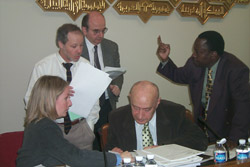 On the second day of the second meeting of the Experts'
Panel on Access and Benefit-Sharing under the Convention on Biological
Diversity (CBD), delegates met in two working groups and smaller contact
groups throughout the day. Working Group I (WG-I) addressed assessment of
user and provider experience in access to genetic resources and
benefit-sharing (ABS) in morning and evening sessions, with four drafting
groups meeting in the afternoon to discuss prior informed consent (PIC),
benefit-sharing, intellectual property rights (IPR) and traditional
knowledge, and capacity building. Working Group II (WG-II) met in morning
and brief afternoon sessions to review draft points on the involvement of
stakeholders in ABS. On the second day of the second meeting of the Experts'
Panel on Access and Benefit-Sharing under the Convention on Biological
Diversity (CBD), delegates met in two working groups and smaller contact
groups throughout the day. Working Group I (WG-I) addressed assessment of
user and provider experience in access to genetic resources and
benefit-sharing (ABS) in morning and evening sessions, with four drafting
groups meeting in the afternoon to discuss prior informed consent (PIC),
benefit-sharing, intellectual property rights (IPR) and traditional
knowledge, and capacity building. Working Group II (WG-II) met in morning
and brief afternoon sessions to review draft points on the involvement of
stakeholders in ABS.
Editor's Note: As a matter of policy, the Earth
Negotiations Bulletin does not directly attribute statements in
informal discussions when requested to do so.
Above photo: WGI Chair L.V. Kalakoutskii in consultation with
the Secretariat before instructing delegates to break up into drafting
groups
|
WORKING
GROUP I – USER AND PROVIDER EXPERIENCES
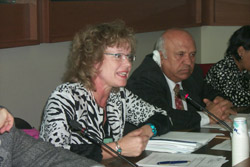 Experts reacted to the
draft summary, suggesting that elements be prioritized and that
the group follow the mandate of identifying elements and types of
guidelines, including suggestions given by the first Experts'
Panel. A number of experts expressed general support for the text.
Specific comments involved, inter alia: adding reference to
the Global Biodiversity Information Facility; linking focal points
to user measures; deleting reference to registers, records and
certifications; emphasizing capacity building; deleting the
section on complementary options to avoid duplication of points to
be defined under Agenda Item 3.3 (Complementary Options);
differentiating users into categories; noting the difficulty of
identifying countries of origin; and including IPRs along with
references to patents. Experts reacted to the
draft summary, suggesting that elements be prioritized and that
the group follow the mandate of identifying elements and types of
guidelines, including suggestions given by the first Experts'
Panel. A number of experts expressed general support for the text.
Specific comments involved, inter alia: adding reference to
the Global Biodiversity Information Facility; linking focal points
to user measures; deleting reference to registers, records and
certifications; emphasizing capacity building; deleting the
section on complementary options to avoid duplication of points to
be defined under Agenda Item 3.3 (Complementary Options);
differentiating users into categories; noting the difficulty of
identifying countries of origin; and including IPRs along with
references to patents.
Above photo: Danish expert Lene Lang making reference to
the Global Biodiversity Information Facility (GBIF) during the
morning session of WGI.
|
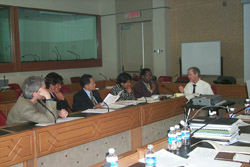 The
group on PIC addressed as key elements: identification of the
person who gives consent; user responsibility; PIC and capacity
building; and other possible elements, including traceability and
tracking of sources of material, specification of country of
origin in patents and other forms of IPR, conflict resolution, and
the role of national focal points and competent national
authorities. The
group on PIC addressed as key elements: identification of the
person who gives consent; user responsibility; PIC and capacity
building; and other possible elements, including traceability and
tracking of sources of material, specification of country of
origin in patents and other forms of IPR, conflict resolution, and
the role of national focal points and competent national
authorities.
Left
photo: The drafting group on PIC.
|
During a late evening
session, WG-I discussed text produced by a drafting committee
charged with integrating the results of the four drafting groups.
|
WORKING
GROUP II – STAKEHOLDER INVOLVEMENT:
|
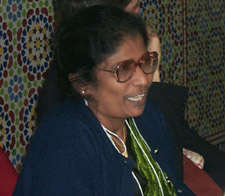
During a morning
session, WG-II continued its deliberations on a series of draft
points on approaches to stakeholder involvement in ABS processes,
focusing on three specific areas: identification of stakeholders;
examples of involvement; and identification of approaches for
stakeholder involvement.
Left photo: WGI Chair Anoja Wickramasinghe tackled
the issue on stakeholder involvement during the morning sessionof
WGI.
|
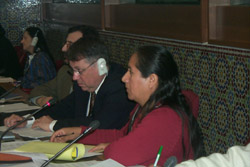 Another participant
proposed text on the need for a high degree of participation of
indigenous people throughout the ABS process, when their
knowledge, territories and biological resources are involved. Another participant
proposed text on the need for a high degree of participation of
indigenous people throughout the ABS process, when their
knowledge, territories and biological resources are involved.
Right
photo: Indigenous observer Esther Camac
|
SIDE
EVENT: " The Battle of the Beans" - Biopiracy in Mexico
and the Andes
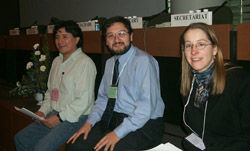
A
lunchtime presentation concerning the "enola" bean
patent and the latest biopiracy controversy involving the nuña
bean a.k.a. popping bean was given by Alejandro Argumedo
(Indigenous People's Biodiversity Network), Julie Delahanty (RAFI)
and Carlos Fernandez (Mexico).
|
Photos
from the reception hosted by the CBD:
|
|
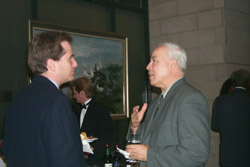
|
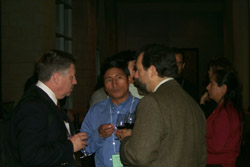
|
|
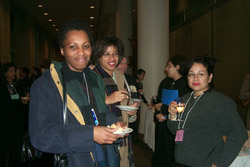
|
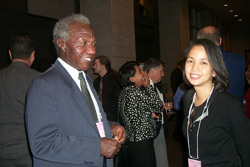
|
|
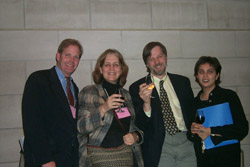
|
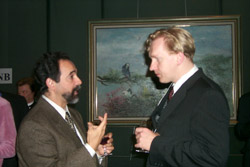
|